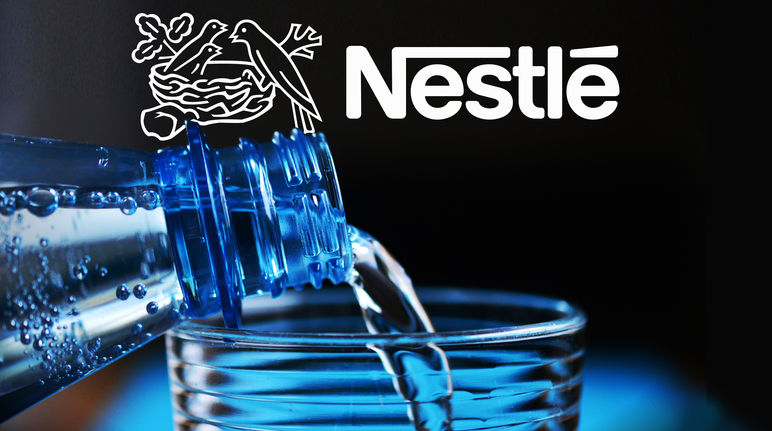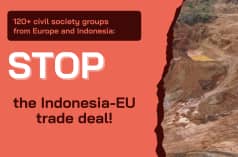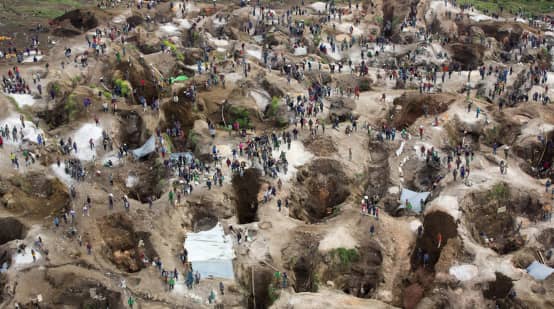Stop the mineral water madness, Nestlé!
 Nestlé is one of the world’s largest sellers of bottled water. (© CC0 - Collage Rettet den Regenwald)
Nestlé is one of the world’s largest sellers of bottled water. (© CC0 - Collage Rettet den Regenwald)
It’s absurd: Nestlé is extracting mineral water in the French town of Vittel, while locals will soon have to rely on a pipeline for their drinking water. And then there are the mountains of plastic waste and ecological impact of shipping water across continents – there’s no excuse for the damage the water business is causing.
Call to actionWill water taps soon be running dry in the French town of Vittel? The authorities have allowed Nestlé to help itself to one million cubic meters of mineral water there annually. Environmentalists and locals warn that this quantity is not sustainable – the groundwater level has been dropping by 30 centimeters annually. It is currently 10 meters below its natural level.
The locals are running out of drinking water. An absurd solution to the problem has been proposed: Vittel – a town whose sole claim to fame is its water – will get its tap water via a 12 kilometer long pipeline. The cost of the €50 million pipeline will be covered by the water bills of the citizens of Vittel. In effect, the townspeople will be personally subsidizing Nestlé’s water business.
Nestlé is aware of the problem and has “voluntarily” reduced its rate of extraction by 20 percent. At the same time, however, it acknowledges that this will not be enough.
The water business is far more than a local problem. The production of plastic bottles consumes significant resources, and the bottles later contribute to the mountains of plastic waste blighting the planet.
The bottles are then transported over long distances: Vittel is available throughout Europe, and the Nestlé brands Acqua Panna and S. Pellegrino are shipped up to 9,000 km from Italy to the west coast of the United States. Nestlé's French carbonated water Perrier is available in no less than 140 countries worldwide.
The market for premium bottled water is simply superfluous: in most developed countries, the purity of tap water matches anything that comes out of a plastic bottle. In many cases, its quality is more closely monitored than that of bottled water.
Enough is enough. Tell Nestlé to get out of the water business.
BackgroundNestlé is not solely to blame in Vittel
In addition to Nestlé, the cheese manufacturer Ermitage extracts 500,000 cubic meters of water annually in Vittel. The two companies together use 47 percent of the available water – private consumption accounts for only 22 percent.
Nestlé – the water giant
Nestlé sells water under more than 50 brand names on all continents. These include Acqua Panna and San Pellegrino from Italy and Contrex, Perrier and Vittel from France.
The global water problem
The trade in water by corporations such as Nestlé is only part of the worldwide water crisis currently taking shape. Much larger quantities of water are polluted by pesticides, herbicides and nitrates from industrial agriculture, or used to irrigate largely unnecessary, water-intense plantations such as eucalyptus or avocado with often devastating ecological consequences. Numerous dam projects endanger the water supply of people along the lower reaches of rivers. Golf courses, swimming pools, car washes – the ways in which water is polluted or wasted are countless. However, that does not mean that Nestlé and other corporations should be let off the hook simply because there are worse problems out there.
Water is common property
The water business is a classic case of neoliberalism – it amounts to the privatization of common property, putting business interests first and local people in the back seat.
Background information in French
https://www.60millions-mag.com/2018/04/18/nestle-accuse-d-epuiser-l-eau-de-vittel-11729
http://www.rallumerlesetoiles.com/2018/03/a-vittel-l-eau-de-nestle-ne-coule-plus-de-source.html
https://lafranceinsoumise.fr/2018/03/20/question-ecrite-nappe-phreatique-de-vittel/
To: the Nestlé Board of Directors
Ladies and Gentlemen,
Nestlé is currently extracting an annual 750,000 cubic meters of water in the French town of Vittel. The quantities being pumped out of the ground are not sustainable. The groundwater level has been dropping by 30 centimeters a year.
Your company is aware of the problem and has already reduced its extraction by 20 percent, while at the same time acknowledging that this is not enough to maintain the groundwater.
Mineral water from Vittel and your company’s other sources is generally transported in plastic bottles over hundreds or thousands of kilometers to consumers.
The environmental impact of these practices is cause for great concern.
We therefore call on you to withdraw from the water business.
Yours faithfully,













 Recent successes
Recent successes